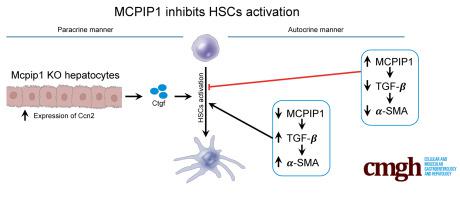当前位置:
X-MOL 学术
›
Cell. Mol. Gastroenterol. Hepatol.
›
论文详情
Our official English website, www.x-mol.net, welcomes your feedback! (Note: you will need to create a separate account there.)
MCPIP1 Inhibits Hepatic Stellate Cell Activation in Autocrine and Paracrine Manners, Preventing Liver Fibrosis
Cellular and Molecular Gastroenterology and Hepatology ( IF 7.2 ) Pub Date : 2024-02-03 , DOI: 10.1016/j.jcmgh.2024.01.021 Natalia Pydyn , Anna Ferenc , Katarzyna Trzos , Ewelina Pospiech , Mateusz Wilamowski , Olga Mucha , Piotr Major , Justyna Kadluczka , Pedro M. Rodrigues , Jesus M. Banales , Jose M. Herranz , Matias A. Avila , Tomasz Hutsch , Piotr Malczak , Dorota Radkowiak , Andrzej Budzynski , Jolanta Jura , Jerzy Kotlinowski
Cellular and Molecular Gastroenterology and Hepatology ( IF 7.2 ) Pub Date : 2024-02-03 , DOI: 10.1016/j.jcmgh.2024.01.021 Natalia Pydyn , Anna Ferenc , Katarzyna Trzos , Ewelina Pospiech , Mateusz Wilamowski , Olga Mucha , Piotr Major , Justyna Kadluczka , Pedro M. Rodrigues , Jesus M. Banales , Jose M. Herranz , Matias A. Avila , Tomasz Hutsch , Piotr Malczak , Dorota Radkowiak , Andrzej Budzynski , Jolanta Jura , Jerzy Kotlinowski

|
Hepatic fibrosis is characterized by enhanced deposition of extracellular matrix (ECM), which results from the wound healing response to chronic, repeated injury of any etiology. Upon injury, hepatic stellate cells (HSCs) activate and secrete ECM proteins, forming scar tissue, which leads to liver dysfunction. Monocyte-chemoattractant protein-induced protein 1 (MCPIP1) possesses anti-inflammatory activity, and its overexpression reduces liver injury in septic mice. In addition, mice with liver-specific deletion of develop features of primary biliary cholangitis. In this study, we investigated the role of MCPIP1 in liver fibrosis and HSC activation. We analyzed MCPIP1 levels in patients’ fibrotic livers and hepatic cells isolated from fibrotic murine livers. In vitro experiments were conducted on primary HSCs, cholangiocytes, hepatocytes, and LX-2 cells with MCPIP1 overexpression or silencing. MCPIP1 levels are induced in patients’ fibrotic livers compared with their nonfibrotic counterparts. Murine models of fibrosis revealed that its level is increased in HSCs and hepatocytes. Moreover, hepatocytes with Mcpip1 deletion trigger HSC activation via the release of connective tissue growth factor. Overexpression of MCPIP1 in LX-2 cells inhibits their activation through the regulation of expression, and this phenotype is reversed upon MCPIP1 silencing. We demonstrated that MCPIP1 is induced in human fibrotic livers and regulates the activation of HSCs in both autocrine and paracrine manners. Our results indicate that MCPIP1 could have a potential role in the development of liver fibrosis.
中文翻译:

MCPIP1 以自分泌和旁分泌方式抑制肝星状细胞活化,预防肝纤维化
肝纤维化的特征是细胞外基质(ECM)沉积增强,这是由于任何病因造成的慢性、反复损伤的伤口愈合反应所致。损伤后,肝星状细胞 (HSC) 激活并分泌 ECM 蛋白,形成疤痕组织,从而导致肝功能障碍。单核细胞趋化蛋白诱导蛋白 1 (MCPIP1) 具有抗炎活性,其过度表达可减轻脓毒症小鼠的肝损伤。此外,肝脏特异性缺失的小鼠会出现原发性胆汁性胆管炎的特征。在本研究中,我们研究了 MCPIP1 在肝纤维化和 HSC 激活中的作用。我们分析了患者纤维化肝脏和从纤维化小鼠肝脏中分离出的肝细胞中的 MCPIP1 水平。在 MCPIP1 过表达或沉默的原代 HSC、胆管细胞、肝细胞和 LX-2 细胞上进行了体外实验。与非纤维化肝脏相比,患者纤维化肝脏中的 MCPIP1 水平会被诱导。小鼠纤维化模型显示其水平在 HSC 和肝细胞中增加。此外,Mcpip1 缺失的肝细胞通过释放结缔组织生长因子触发 HSC 激活。 LX-2 细胞中 MCPIP1 的过度表达通过表达调节抑制其激活,并且这种表型在 MCPIP1 沉默后逆转。我们证明 MCPIP1 在人纤维化肝脏中被诱导,并以自分泌和旁分泌方式调节 HSC 的激活。我们的结果表明 MCPIP1 可能在肝纤维化的发展中发挥潜在作用。
更新日期:2024-02-03
中文翻译:

MCPIP1 以自分泌和旁分泌方式抑制肝星状细胞活化,预防肝纤维化
肝纤维化的特征是细胞外基质(ECM)沉积增强,这是由于任何病因造成的慢性、反复损伤的伤口愈合反应所致。损伤后,肝星状细胞 (HSC) 激活并分泌 ECM 蛋白,形成疤痕组织,从而导致肝功能障碍。单核细胞趋化蛋白诱导蛋白 1 (MCPIP1) 具有抗炎活性,其过度表达可减轻脓毒症小鼠的肝损伤。此外,肝脏特异性缺失的小鼠会出现原发性胆汁性胆管炎的特征。在本研究中,我们研究了 MCPIP1 在肝纤维化和 HSC 激活中的作用。我们分析了患者纤维化肝脏和从纤维化小鼠肝脏中分离出的肝细胞中的 MCPIP1 水平。在 MCPIP1 过表达或沉默的原代 HSC、胆管细胞、肝细胞和 LX-2 细胞上进行了体外实验。与非纤维化肝脏相比,患者纤维化肝脏中的 MCPIP1 水平会被诱导。小鼠纤维化模型显示其水平在 HSC 和肝细胞中增加。此外,Mcpip1 缺失的肝细胞通过释放结缔组织生长因子触发 HSC 激活。 LX-2 细胞中 MCPIP1 的过度表达通过表达调节抑制其激活,并且这种表型在 MCPIP1 沉默后逆转。我们证明 MCPIP1 在人纤维化肝脏中被诱导,并以自分泌和旁分泌方式调节 HSC 的激活。我们的结果表明 MCPIP1 可能在肝纤维化的发展中发挥潜在作用。



























 京公网安备 11010802027423号
京公网安备 11010802027423号